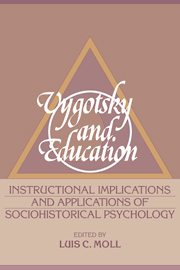Book contents
- Frontmatter
- Contents
- List of contributors
- Preface
- Acknowledgments
- Introduction
- Part I Historical and theoretical issues
- 1 Vygotsky: The man and his cause
- 2 The historical context of Vygotsky's work: A sociohistorical approach
- 3 Cognitive development and formal schooling: The evidence from cross-cultural research
- 4 The voice of rationality in a sociocultural approach to mind
- 5 The social origins of self-regulation
- 6 Vygotsky, the zone of proximal development, and peer collaboration: Implications for classroom practice
- Part II Educational implications
- Part III Instructional applications
- Name index
- Subject index
3 - Cognitive development and formal schooling: The evidence from cross-cultural research
Published online by Cambridge University Press: 05 June 2012
- Frontmatter
- Contents
- List of contributors
- Preface
- Acknowledgments
- Introduction
- Part I Historical and theoretical issues
- 1 Vygotsky: The man and his cause
- 2 The historical context of Vygotsky's work: A sociohistorical approach
- 3 Cognitive development and formal schooling: The evidence from cross-cultural research
- 4 The voice of rationality in a sociocultural approach to mind
- 5 The social origins of self-regulation
- 6 Vygotsky, the zone of proximal development, and peer collaboration: Implications for classroom practice
- Part II Educational implications
- Part III Instructional applications
- Name index
- Subject index
Summary
It is the dilemma of psychology to deal as a natural science with an object that creates history.
Ernst BoeschMy goal in this chapter is to summarize the implications for understanding cognitive development of the past three decades of intensive cross-cultural research on the cognitive consequences of formal educational experience during middle childhood. Furthermore, in concert with the theme of this book, I will approach this topic from the perspective of the sociohistorical school associated with the names of Lev S. Vygotsky, Alexei N. Leontiev, Alexander R. Luria, and their followers.
Some basic presuppositions
As described by Luria (1979), the sociohistorical school of psychology emerged in the 1920s as an explicit attempt to resolve the widely perceived dilemma commented on by Ernst Boesch in the epigraph with which this chapter begins: Scientific psychology, conceived as an experimental discipline, depends upon the assumption that the processes it studies are universal (and hence not dependent upon the exigencies of time and place), yet human beings manifestly are creatures who create history, rendering psychological processes historically contingent (and thus inappropriate objects of study using experimental methods).
Wilhelm Wundt, titular father of scientific psychology, was acutely aware of this problem. His solution was to declare that psychology must be two sciences. The first, experimental psychology, was to be an experimental, explanatory science, in the mold of the natural sciences such as physics. Its task was to be the analysis of the contents of individual human consciousness into its elements and a specification of the universal laws according to which these elements combine.
- Type
- Chapter
- Information
- Vygotsky and EducationInstructional Implications and Applications of Sociohistorical Psychology, pp. 89 - 110Publisher: Cambridge University PressPrint publication year: 1990
- 60
- Cited by



